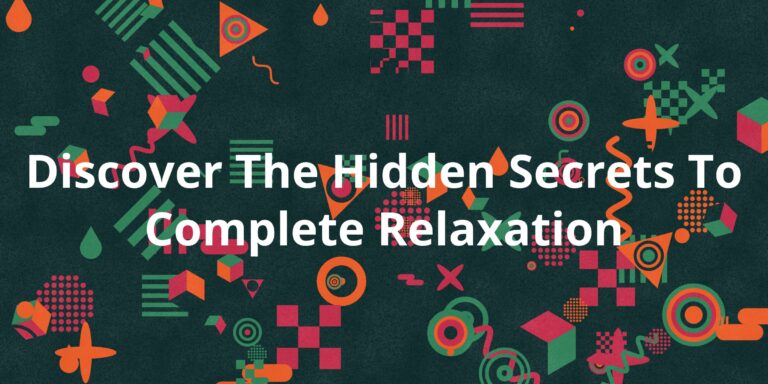Relaxation is an essential part of our daily lives. It allows us to unwind, recharge, and refresh our minds and bodies. There are many ways to relax, but not all of them are created equal. In this ultimate guide to true facts about relaxation, we will explore the different types of relaxation techniques and their benefits for both physical and mental health.
1. Deep Breathing
Deep breathing is a simple yet effective way to relax. It involves taking slow, deep breaths in through your nose and out through your mouth. This technique can help to reduce stress, anxiety, and improve overall well-being.
2. Progressive Muscle Relaxation
Progressive muscle relaxation (PMR) is a technique that involves tensing and relaxing different muscle groups in the body. It helps to release tension and promote relaxation throughout the body. PMR has been shown to be effective in reducing stress, anxiety, and pain.
3. Meditation
Meditation is a practice that involves focusing your attention on a particular object, thought, or activity to train your mind to be more relaxed and focused. There are many different types of meditation, including mindfulness meditation, guided meditation, and transcendental meditation. Regular meditation has been shown to reduce stress, anxiety, and improve overall well-being.
4. Yoga
Yoga is a practice that combines physical postures, breathing exercises, and meditation to promote relaxation and wellness. It can help to reduce stress, improve flexibility, and increase strength.
5. Massage
Massage therapy involves using touch to manipulate the soft tissues of the body. It can help to reduce muscle tension, promote relaxation, and improve overall well-being.
6. Exercise
Regular exercise has been shown to be an effective way to reduce stress, improve mood, and promote relaxation. Exercise releases endorphins, which are natural painkillers that also help to improve mood.
7. Aromatherapy
Aromatherapy involves using essential oils from plants to promote relaxation and wellness. Essential oils can be used in a diffuser, applied topically, or added to bath water. Some common essential oils for relaxation include lavender, chamomile, and ylang-ylang.
8. Nature Walks
Spending time in nature can help to promote relaxation and reduce stress. Nature walks involve taking a leisurely stroll through a natural setting, such as a park or forest. This technique can be particularly effective for people who live in urban areas.
9. Time Management
Stress often arises from feeling overwhelmed and not having enough time to accomplish everything. Effective time management techniques can help to reduce stress and promote relaxation. These techniques include prioritizing tasks, breaking large tasks into smaller, manageable ones, and avoiding procrastination.
10. Positive Thinking
Positive thinking involves focusing on positive thoughts and emotions rather than negative ones. This technique can help to reduce stress and improve overall well-being.
In conclusion, relaxation is an essential part of our daily lives. There are many different ways to relax, but not all of them are created equal. The techniques listed above have been shown to be effective in reducing stress, improving mood, and promoting relaxation. By incorporating these techniques into your daily routine, you can improve your overall well-being and live a happier, healthier life.



